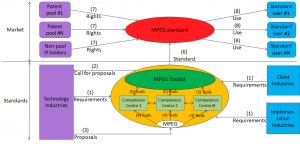It is hard to talk sensibly to the general public about standards. It is a pity because standards are important as they ensure e.g. that nuts match with bolts, paper sheets feed into printers, music files play on handsets and a lot more.
One reason is that standards are one of the most ethereal things on Earth as they concern interfaces between systems. Another reason is that the many industries created by human endeavour have developed their own customs: what is a must in one industry can be anathema in another. Yet another is the fact that standards are often the offspring of innovation, often generating flows of money that can be anything from a trickle to a swollen river.
Standards used to have a direct impact on industry, but only rarely on end users, at most only on a small portion of them. Recently, however, Information and Communication Technologies (ICT) have become so pervasive, affecting companies by the thousands and people by the billions, that standards underpinning the industry have assumed unseen impact and visibility.
One of the most egregious cases is the ISO/IEC standard called High Efficiency Video Coding (HEVC). Work on this standard started in January 2010 and ended with the first release exactly 3 years later. As of July 2017 there are 3 patent pools (one representing 35 patent holders) and a number of companies (not represented by any patent pool) all claiming to have Intellectual Property (IP) on the standard.
It is no surprise that most people do not even know about HEVC because it is seldom – if ever – used in audio-visual services, and this 4 and a half years after industries could implement the standard – 18 months longer than it took to develop the standard itself. And some people say that standardisation takes too long!
This situation creates three clear losers:
- Companies that have contributed their technologies to the standard do not get the benefits of their investment;
- Companies that would be ready to use HEVC – in products, services and applications – because it performs better (by 60%) than Advanced Video Coding (AVC) currently in use are practically prevented from using it;
- End users are deprived of their right to get better or new services, or simply services where it was not possible to have them before.
If there is market failure when the good/service allocation is not efficient because one can imagine a different situation where many individuals are better-off without making others worse-off, then we are in front of a market failure.
Or maybe not. According to recent news Apple has announced that they will support HEVC in High Sierra (macOS) and iOS 11. One expects that a company as important as Apple does not make such an announcement if they do not have their back well covered.
But is this a big news? It depends on how you look at it.
- Actually not so big, because major handset manufacturers are reportedly already installing HEVC chips in their handsets. So the Apple news is the software equivalent of a déjà vu and we are in in front of a market failure.
- If the news is as big as some people claim it is, then we are forced to conclude that only a company worth 800 B$ can get the licence required to exercise the HEVC standard. So we are in front of market success.
Maybe not, or maybe yes. If we are in front of market success, we have sacrificed a major principle of international standardisation enshrined in the ISO/IEC Directives: standards must be accessible to everybody on a nondiscriminatory basis on reasonable terms and conditions. Everybody of the size of Apple Inc., I mean.
The problem of these well-intentioned rules is that they were developed at a time when patents relevant to a standard were typically held by one company. Even with tens of MPEG-2 and AVC patent holders, things were still under control because there was one patent pool and a limited number of patent holders outside. However, in HEVC we are dealing with close to 100 patent holders grouped in 3 patent pools and a significant number of patents holders outside. HEVC is not the exception, but the rule, in this and future standards.
The sentence underlined does not imply that it is always necessary to pay in order to access a standard. If an amount has to be paid, it should be the same for all. If access is free it should be free for all.
The devil, they say, is in the details. Per ISO/IEC Directives a patent holder is not obliged to disclose which patents are relevant to a technology proposed for a standard. This is not ideal but acceptable if the patent holder intends to license the technologies contributed for a fee, because precise identification of relevant patents will be part of the development of licensing terms with a now well-honed process.
If, however, access to the standard is intended to be free of charge, such “blanket” declarations should not be acceptable because the committee developing a standard has no means to remove a technology claimed to infringe a patent. Declarations may come from companies that have more patents than employees and there is no process to develop licensing terms.
It should also not be acceptable that patent holders make patent declaration where they declare they own relevant patents that they do not intend to licence. Again the committee developing the standard has no means to remove the infringing technology.
These problems have been identified and brought to an appropriate level in ISO/IEC. Is anything going to happen? Don’t count on it. At the meeting where the problems were presented, delegates from a handful of countries disputed the process that brought the matter to the attention of the committee, but no discussion could take place on the substance of the matter.
Something is rotten in the state of Denmark, and some are determined to keep it rotten.
Posts in this thread (in bold this post)
- The MPEG ecosystem
- Why is MPEG successful?
- MPEG can also be green
- The life of an MPEG standard
- Genome is digital, and can be compressed
- Compression standards and quality go hand in hand
- Digging deeper in the MPEG work
- MPEG communicates
- How does MPEG actually work?
- Life inside MPEG
- Data Compression Technologies – A FAQ
- It worked twice and will work again
- Compression standards for the data industries
- 30 years of MPEG, and counting?
- The MPEG machine is ready to start (again)
- IP counting or revenue counting?
- Business model based ISO/IEC standards
- Can MPEG overcome its Video “crisis”?
- A crisis, the causes and a solution
- Compression – the technology for the digital age
- On my Charles F. Jenkins Lifetime Achievement Award
- Standards for the present and the future


